Technology has transformed the way we live, making everyday tasks easier and more efficient. For people with disabilities, smart home technology is more than just a convenience—it provides independence, security, and comfort. With the right devices, individuals can control lights, doors, appliances, and entertainment systems with voice commands or simple gestures.
The rise of smart home automation means that tasks that once required physical effort can now be done with a tap on a smartphone or a voice command. Whether it’s adjusting room temperature, unlocking doors, or setting reminders, smart devices offer practical solutions to enhance accessibility at home.
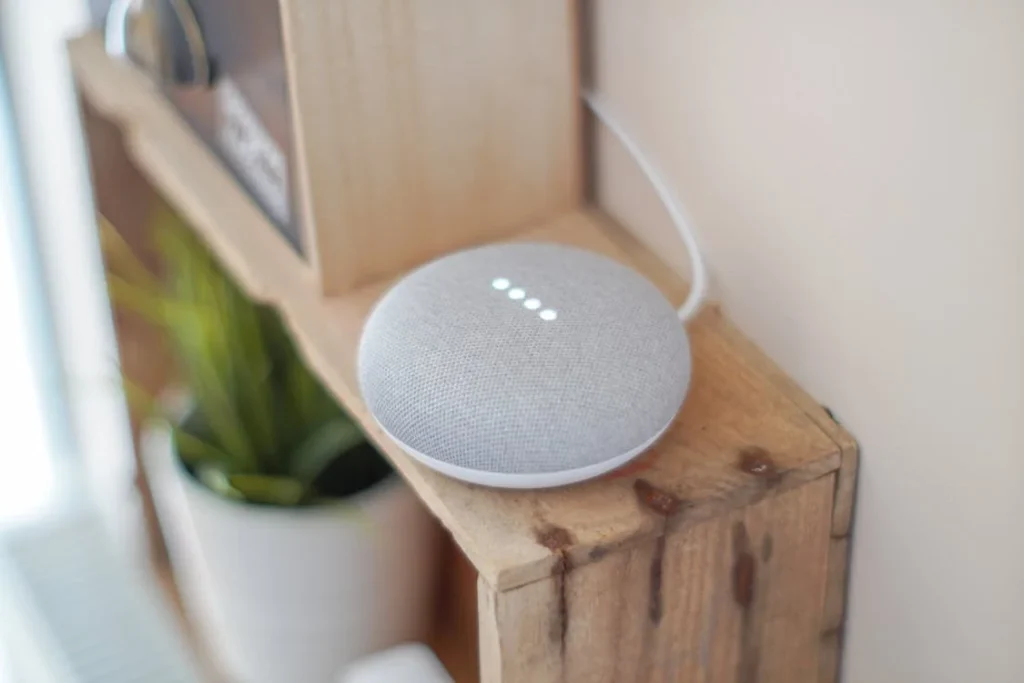
Voice-Controlled Assistants for Hands-Free Living
One of the most transformative advancements in smart home technology is the rise of voice-controlled assistants. Devices such as Amazon Alexa, Google Assistant, and Apple Siri have changed the way people interact with their homes.
For individuals with disabilities, these virtual assistants offer a new level of independence by enabling them to control multiple devices with just their voice.
Making Everyday Tasks Easier
Voice assistants allow users to perform tasks without needing to physically interact with switches, remotes, or buttons. Simple voice commands can turn lights on and off, adjust the thermostat, play music, or even provide weather updates.
This is especially beneficial for individuals with limited mobility, as it reduces the need to move across the room to perform basic tasks.
For those with vision impairments, these devices serve as personal assistants, reading out messages, setting reminders, and providing navigation assistance.
Users can ask their assistant to read the news, dictate emails, or even make phone calls without having to use a touchscreen or keyboard. This level of accessibility ensures that daily activities remain seamless and stress-free.
Enhancing Safety and Security
Voice-controlled assistants also improve home security, an essential aspect of independent living. Smart locks can be integrated with these assistants, allowing individuals to lock or unlock doors using voice commands.
This is particularly useful for individuals with prosthetics or limited hand strength, as it eliminates the need to turn keys or manually operate locks.
Security cameras can also be connected to voice assistants, enabling users to check who is at the door without having to move.
For individuals with hearing impairments, smart assistants can be programmed to provide visual alerts or vibrations on their smartphones when someone rings the doorbell or enters the home. These features provide peace of mind and an added layer of protection.
Customizing the Experience
One of the greatest advantages of voice-controlled assistants is their ability to be customized for individual needs. Users can create specific routines that trigger multiple actions at once.
For example, a morning routine can be set up where the lights gradually turn on, the coffee maker starts brewing, and the news begins playing—all with a single command.
For individuals with memory challenges, smart assistants can provide reminders for medications, doctor’s appointments, or daily activities.
They can also be programmed to send alerts to caregivers or family members in case of an emergency. These personalized features ensure that the home is not only accessible but also responsive to the unique needs of each user.
At Robobionics, we believe that technology should empower individuals to live independently. Integrating smart home devices with prosthetic solutions can enhance accessibility and ease of use.
If you’re looking for ways to improve your daily life with advanced assistive technology, contact us today to explore customized solutions.
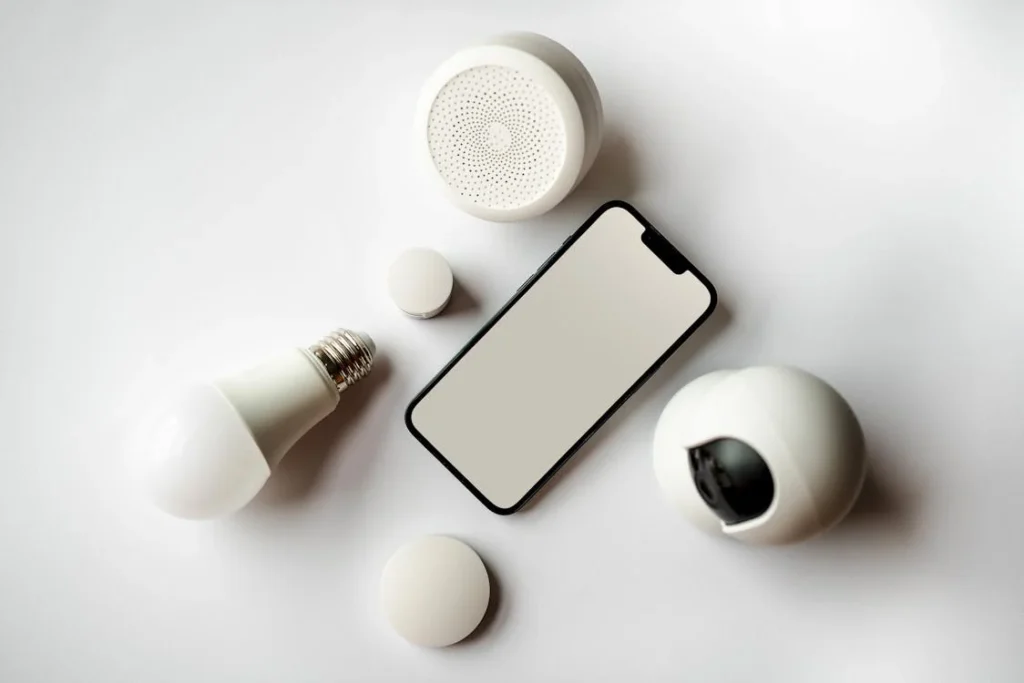
Smart Lighting and Environmental Control for Greater Comfort
Lighting and temperature control play a major role in creating a comfortable and accessible home environment. For individuals with disabilities, adjusting these settings manually can sometimes be challenging.
Smart home technology eliminates these difficulties by allowing users to control lighting, fans, air conditioning, and other appliances with voice commands, mobile apps, or automated schedules.
Hands-Free Lighting for Convenience and Safety
Smart lighting systems make it easy to control brightness and color settings without the need to reach for switches. Voice-activated bulbs, motion sensor lights, and mobile-controlled systems allow users to adjust their home’s lighting with minimal effort.
For someone with limited mobility, this means no more struggling to reach switches or navigating dark spaces to find them.
Motion sensor lighting is especially useful for individuals with mobility impairments. As soon as they enter a room, the lights turn on automatically, reducing the risk of falls or accidents.
This feature is particularly beneficial in hallways, staircases, and bathrooms, where proper lighting is crucial for safety.
For individuals with visual impairments, smart lighting can be customized to provide optimal brightness levels that make it easier to move around safely. Some systems also offer high-contrast lighting adjustments to improve visibility in different areas of the home.
Temperature Control for Comfort and Energy Efficiency
Maintaining a comfortable indoor temperature is essential for well-being. However, traditional thermostats require manual adjustments, which can be inconvenient for individuals with mobility limitations.
Smart thermostats, such as Nest and Ecobee, allow users to adjust the temperature through voice commands, mobile apps, or automated scheduling.
For individuals with limited hand function, adjusting small dials or buttons on a thermostat can be difficult. Smart thermostats eliminate this challenge by allowing settings to be changed with a single tap on a smartphone or through a pre-programmed schedule.
They can also learn user preferences over time and adjust settings automatically to maintain the ideal temperature throughout the day.
Temperature control is especially important for individuals with medical conditions that make them sensitive to heat or cold.
With smart thermostats, they can ensure that their home remains at a comfortable temperature without the need to frequently adjust settings manually. Some models also integrate with voice assistants, making it even easier to change settings without lifting a finger.
Automating the Home Environment for Seamless Accessibility
The ability to automate lighting and temperature settings based on time, occupancy, or weather conditions enhances both comfort and energy efficiency.
Smart home systems allow users to create schedules that automatically adjust lighting and climate settings throughout the day. For example, lights can dim in the evening to promote relaxation, while thermostats can lower the temperature at night for better sleep.
For individuals with disabilities, automating home environments reduces the need for constant manual adjustments, making daily life smoother and more convenient.
At Robobionics, we understand the importance of integrating smart technology with assistive solutions to enhance independence. If you’re looking for ways to improve accessibility in your home, contact us today to explore customized options that fit your needs.
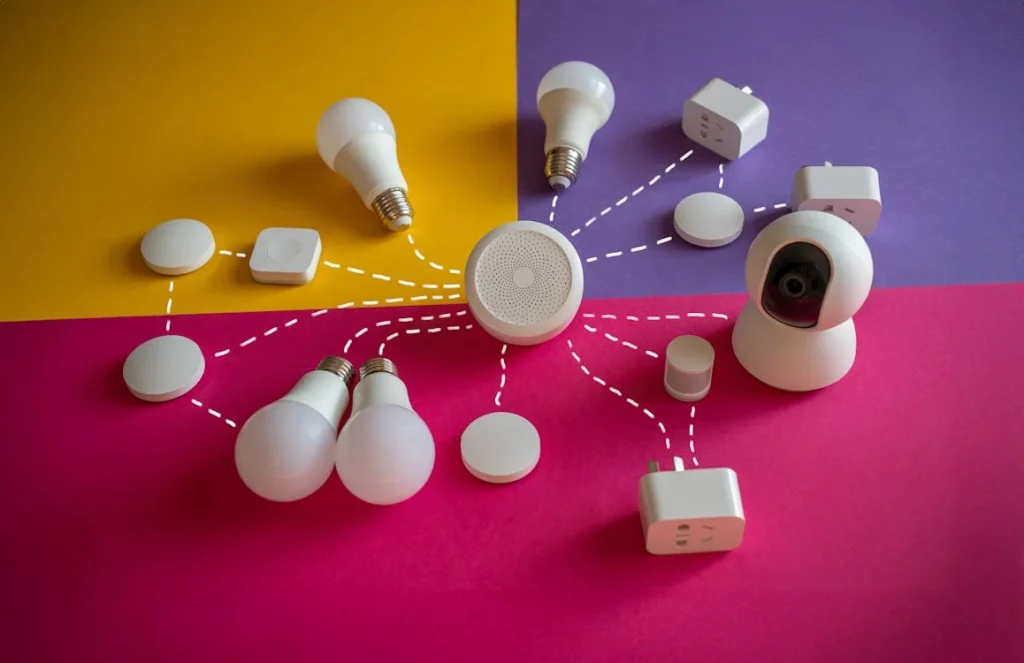
Smart Security Systems for Independence and Safety
A secure home is essential for peace of mind, especially for individuals with disabilities who may face additional challenges when responding to unexpected visitors or emergencies.
Smart security systems provide an extra layer of protection, allowing users to monitor their homes, lock and unlock doors, and receive alerts—all without needing to physically check doors or security panels.
Smart Locks and Keyless Entry for Easy Access
Traditional locks require keys, which can be difficult to use for individuals with limited hand strength or dexterity.
Smart locks eliminate this challenge by allowing users to lock and unlock doors using voice commands, mobile apps, or fingerprint recognition. This makes it easier to enter and exit the home without fumbling for keys.
For individuals with mobility impairments, smart locks offer the ability to control doors remotely. If someone has difficulty getting up quickly to answer the door, they can unlock it using their smartphone.
This is particularly useful for individuals who use wheelchairs or prosthetic limbs, as it reduces unnecessary movement and strain.
Another key benefit of smart locks is the ability to grant temporary access to caregivers, family members, or medical professionals. Instead of handing out physical keys, homeowners can create temporary access codes that allow trusted individuals to enter when needed.
This feature enhances security while maintaining control over who enters the home.
Video Doorbells for Safer Interactions
For individuals who may not be able to quickly reach the door, smart video doorbells provide a convenient way to see and communicate with visitors.
These devices connect to smartphones or voice assistants, allowing homeowners to view live footage and speak with visitors from anywhere in the house.
This feature is particularly useful for individuals with hearing impairments, as many smart doorbells provide visual alerts when someone is at the door. Some models also integrate with smart lights, flashing a signal when the doorbell rings, ensuring that visitors are not missed.
For those with mobility challenges, video doorbells reduce the need to physically approach the door to see who is outside. If the visitor is unfamiliar or unexpected, the homeowner can decide whether to answer or alert a trusted contact for assistance.
Emergency Alerts and Monitoring Systems
In case of an emergency, quick response times are critical. Smart home security systems offer emergency alert features that can notify family members, caregivers, or emergency services with the press of a button or a voice command.
For individuals with disabilities who live alone, wearable emergency buttons or voice-activated SOS commands can provide immediate assistance in case of falls or medical emergencies.
Some smart home systems also integrate with medical alert services, ensuring that help arrives as soon as possible.
Motion sensors and activity tracking can also provide an added layer of security. These features can detect unusual activity, such as a prolonged lack of movement, and send alerts to caregivers or family members.
This is especially beneficial for individuals with conditions that may cause unexpected medical events.
At Robobionics, we believe that independence and safety go hand in hand. Smart security solutions provide individuals with disabilities the freedom to live comfortably while staying protected.
If you’re looking for ways to improve home security and accessibility, contact us today to explore the best solutions for your needs.
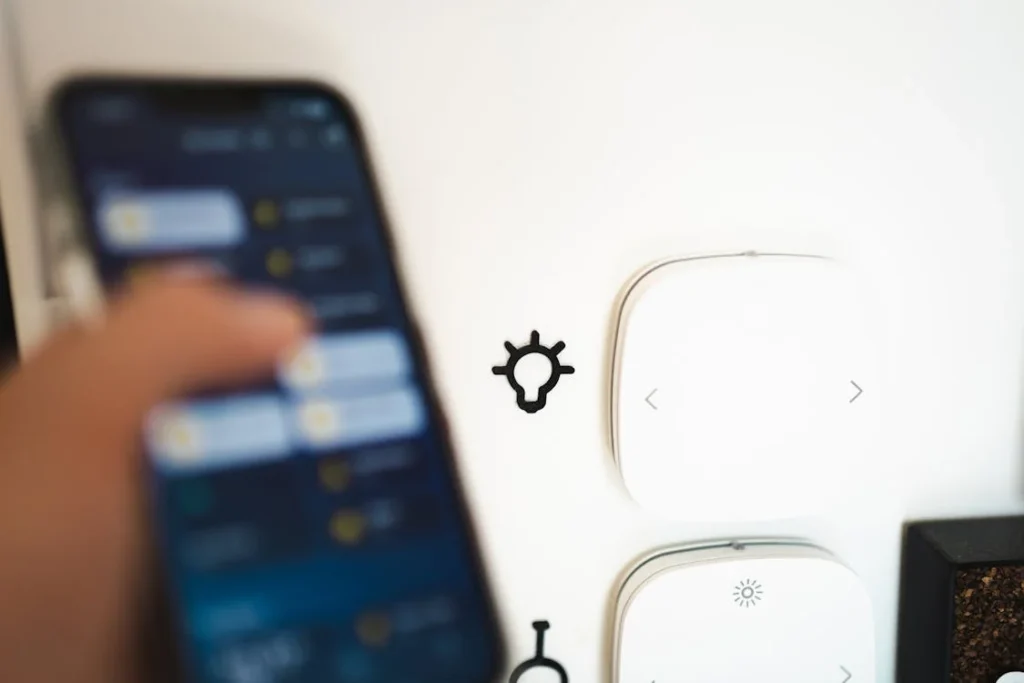
Smart Home Appliances for Effortless Daily Living
Managing household tasks can sometimes be challenging for individuals with disabilities, but smart appliances are changing the way people cook, clean, and maintain their homes.
With voice controls, automation, and remote operation, these appliances eliminate unnecessary physical strain and make daily living more convenient and efficient.
Voice-Activated Kitchen Appliances for Independent Cooking
Cooking can be difficult for individuals with limited mobility, vision impairments, or hand dexterity challenges.
Smart kitchen appliances, such as voice-activated ovens, microwaves, and coffee makers, make meal preparation easier by allowing users to control settings without having to press buttons or turn dials.
Smart refrigerators with touchscreens and voice assistants help users keep track of groceries, suggest recipes based on available ingredients, and send alerts when food is about to expire.
For individuals with visual impairments, these features make it easier to plan meals without having to manually inspect each item.
For individuals with mobility impairments, automated kitchen tools such as smart kettles, one-touch can openers, and adaptive utensils provide additional support.
Many smart appliances can also be controlled remotely via a smartphone, allowing users to start or stop cooking without having to be in the kitchen.
Automated Cleaning Solutions for a Low-Maintenance Home
Household cleaning can be physically demanding, but smart cleaning devices eliminate the need for manual labor. Robotic vacuum cleaners navigate around furniture and clean floors without requiring physical effort.
Some models can be programmed to run at specific times, ensuring that the home remains tidy without constant supervision.
Smart washing machines and dryers can also be controlled remotely, allowing users to start, stop, or adjust cycles without bending down to reach controls. Voice-activated models enable individuals with limited hand mobility to operate appliances simply by speaking commands.
For individuals with allergies or respiratory conditions, smart air purifiers monitor air quality and adjust settings automatically to maintain a clean and healthy indoor environment. These devices provide continuous filtration without requiring users to make manual adjustments.
Smart Water and Energy Management for Efficiency and Safety
Smart home systems also help individuals with disabilities manage water and energy usage more efficiently. Smart faucets with motion sensors reduce the need for manual operation, making handwashing and cooking easier.
Some models allow users to set precise water temperatures to prevent accidental burns, which is particularly useful for individuals with sensory impairments.
For energy management, smart plugs and power strips allow users to control electronic devices remotely. This prevents the need to bend down to unplug appliances or manually switch them off.
Smart home hubs can also monitor electricity usage and provide insights on how to optimize energy consumption, leading to lower utility bills and a more eco-friendly home.
At Robobionics, we understand that a truly accessible home should work for you, not against you. Smart home appliances empower individuals with disabilities to live more independently by reducing physical effort and improving convenience.
If you’re looking for ways to integrate smart technology into your home, contact us today to explore the best solutions for your needs.
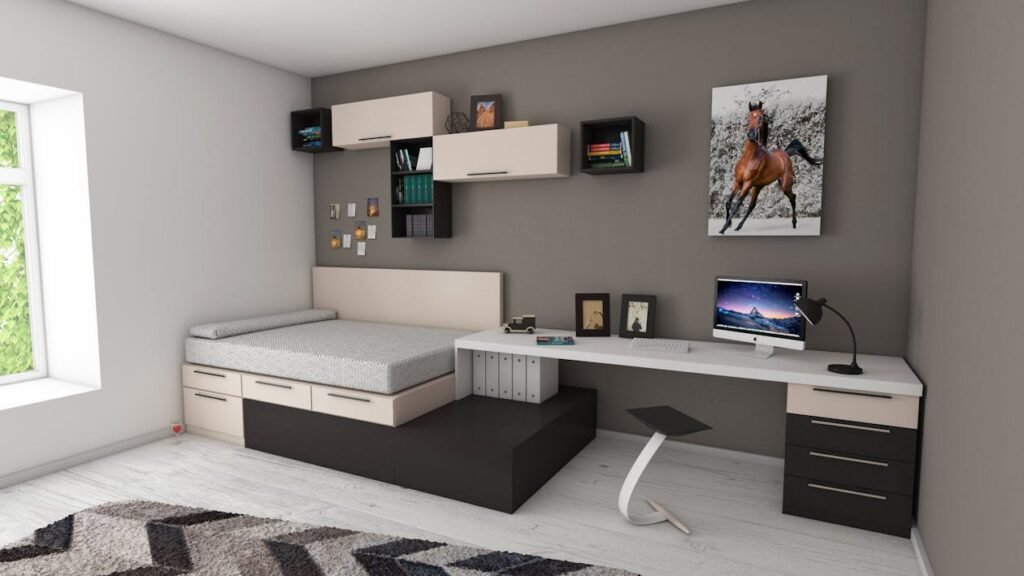
Smart Home Healthcare and Wellness Solutions
Health and wellness are essential for maintaining independence and quality of life. Smart home technology has made it easier for individuals with disabilities to monitor their health, manage medications, and stay connected with healthcare providers.
With automated tracking systems, remote consultations, and wearable devices, managing personal health has never been more convenient.
Remote Health Monitoring for Peace of Mind
For individuals with medical conditions that require regular monitoring, smart health devices provide a simple and effective solution.
Smart blood pressure monitors, glucose meters, and pulse oximeters automatically record readings and send them to a smartphone or a caregiver’s device. This eliminates the need for manual record-keeping and ensures that important health data is always accessible.
Some devices can be set to alert users or family members if a reading is abnormal, prompting timely action. For example, individuals with heart conditions can use smart ECG monitors that detect irregular heart rhythms and notify their doctor immediately.
These devices provide peace of mind, knowing that health conditions are being monitored in real time.
For those with mobility challenges or chronic conditions, wearable health trackers help monitor activity levels, heart rate, and sleep patterns. These insights allow users to make informed decisions about their daily routines and overall health management.
Medication Management Made Simple
Remembering to take medication on time can be challenging, especially for individuals with cognitive disabilities or those taking multiple prescriptions.
Smart medication dispensers and reminder apps help automate this process by sending alerts or dispensing the right dose at the right time.
Some smart pill organizers are equipped with locking mechanisms to prevent accidental double-dosing. Others are integrated with voice assistants, allowing users to ask for medication reminders without needing to check a schedule manually.
These features help individuals maintain their health without the stress of keeping track of multiple prescriptions.
For individuals who require injectable medications, smart insulin pens and auto-injectors ensure accurate dosing and track injection history. These tools reduce the risk of errors and provide valuable data that can be shared with healthcare providers for better treatment planning.
Telemedicine and Virtual Healthcare Services
Accessing healthcare has become easier with the rise of telemedicine. Smart home technology allows individuals to connect with doctors, therapists, and specialists without needing to leave their homes.
Video calls, AI-driven symptom checkers, and remote diagnostic tools enable real-time medical consultations and follow-ups.
For individuals with disabilities, this eliminates the difficulty of traveling to appointments and waiting in clinics. Teletherapy sessions provide mental health support, while virtual physical therapy programs guide users through rehabilitation exercises from the comfort of their homes.
Emergency response systems also play a crucial role in smart home healthcare. Voice-activated emergency alerts, fall detection sensors, and wearable panic buttons ensure that help is just a command away.
These systems automatically notify caregivers or emergency responders if a user needs immediate assistance.
At Robobionics, we believe that technology should empower individuals to live healthier and more independent lives. Our prosthetic solutions work seamlessly with smart home healthcare devices to enhance accessibility and overall well-being.
If you’re interested in integrating health-focused smart technology into your home, contact us today to explore the best options for your needs.
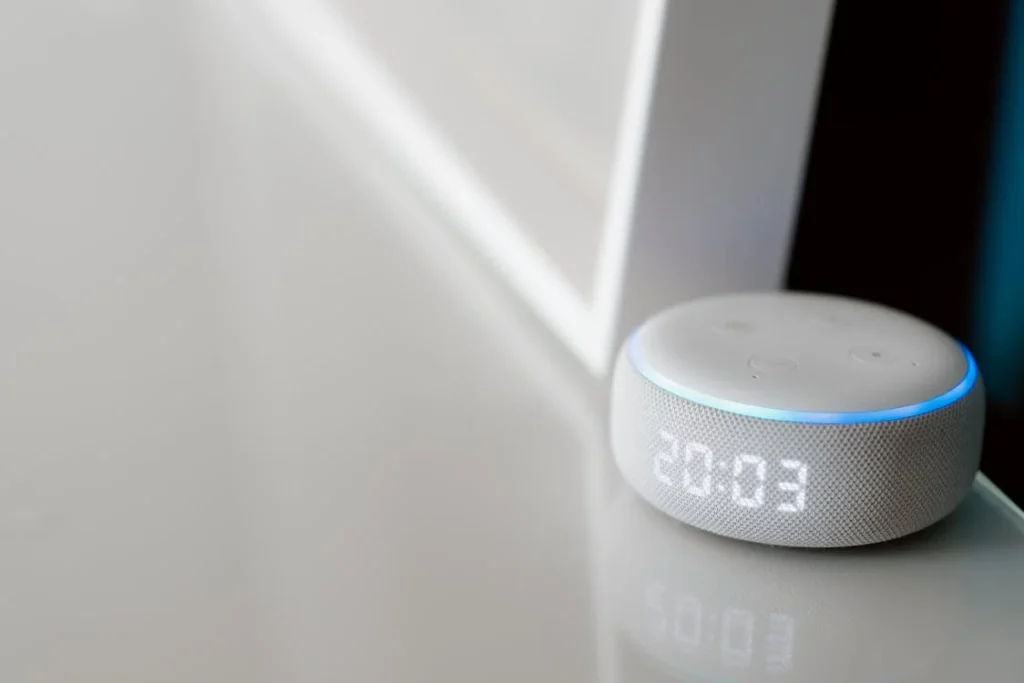
Smart Entertainment and Communication for a More Connected Life
Entertainment and communication are essential for social engagement, relaxation, and staying informed. For individuals with disabilities, smart home technology has made it easier to access digital content, control entertainment systems, and stay connected with loved ones.
From voice-controlled TVs to adaptive communication devices, these innovations ensure that everyone can enjoy media and stay in touch without barriers.
Voice-Controlled Entertainment Systems
Watching movies, listening to music, or browsing the internet no longer requires the use of complex remote controls or small buttons.
Smart TVs, streaming devices, and sound systems can now be operated through voice commands or mobile apps, making it easy for individuals with limited mobility or vision impairments to navigate their entertainment systems.
Voice assistants like Alexa, Google Assistant, and Siri can launch specific channels, adjust volume levels, or even suggest content based on preferences.
For individuals with hearing impairments, closed captioning can be activated with a simple voice command. Many smart TVs also come with screen magnification and high-contrast settings to enhance accessibility for visually impaired users.
For those who enjoy reading, smart home technology has made books more accessible through audiobooks and e-readers with text-to-speech functions.
AI-powered transcription services also convert podcasts, news, and educational content into text, making information accessible to everyone.
Adaptive Gaming and Interactive Entertainment
Video games are a popular form of entertainment, and accessibility in gaming has improved significantly in recent years. Adaptive controllers, eye-tracking technology, and voice-operated gaming systems allow individuals with disabilities to fully participate in gaming experiences.
Microsoft’s Adaptive Controller, for example, enables users to customize their gaming setup based on their abilities, making gaming more inclusive. Virtual reality (VR) has also opened new possibilities for immersive experiences.
VR applications designed for accessibility provide therapeutic benefits, such as relaxation exercises, cognitive training, and virtual travel experiences for individuals who may have difficulty leaving their homes.
These advancements ensure that entertainment is not just about enjoyment but also about improving mental and emotional well-being.
Smart Communication Tools for Staying Connected
Maintaining social connections is crucial for emotional well-being, and smart communication tools have made it easier than ever for individuals with disabilities to stay in touch with family, friends, and caregivers.
Video calling platforms integrated with smart home assistants allow users to make calls using voice commands, eliminating the need for manual dialing.
For individuals with speech impairments, augmentative and alternative communication (AAC) devices provide ways to express thoughts using text-to-speech or symbol-based communication.
AI-powered voice synthesis technology has also improved accessibility by creating personalized voice profiles for users who have difficulty speaking.
For individuals who are deaf or hard of hearing, real-time captioning and sign language recognition software ensure that conversations and video calls remain accessible.
Smart doorbells with video feeds and real-time alerts help users identify visitors without relying on auditory cues.
At Robobionics, we believe that accessibility extends beyond mobility—it includes staying engaged with the world through entertainment and communication.
If you’re looking for assistive technology that enhances your daily life, contact us today to explore the best solutions tailored to your needs.
Conclusion
Smart home technology has transformed the way people with disabilities interact with their environment, making daily tasks easier, safer, and more convenient. From voice-controlled assistants and automated lighting to adaptive security systems and smart healthcare devices, these innovations promote independence and improve quality of life. The ability to control appliances, communicate effortlessly, and access entertainment without physical barriers ensures that homes are more inclusive than ever before.
By integrating smart technology with assistive devices, individuals with disabilities can navigate their spaces with confidence and comfort. As advancements continue, the future of accessibility will only become more seamless and intuitive, empowering people to live on their own terms.
At Robobionics, we are committed to enhancing accessibility through cutting-edge prosthetic solutions and assistive technology. If you’re looking to improve independence and integrate smart home solutions into your lifestyle, contact us today to explore how we can support your journey toward a more accessible future.




thankyou for the sharing
Smart home technology can greatly enhance independence and safety for people with disabilities. For anyone interested in inclusive and accessible living solutions through innovation, this is a valuable read.